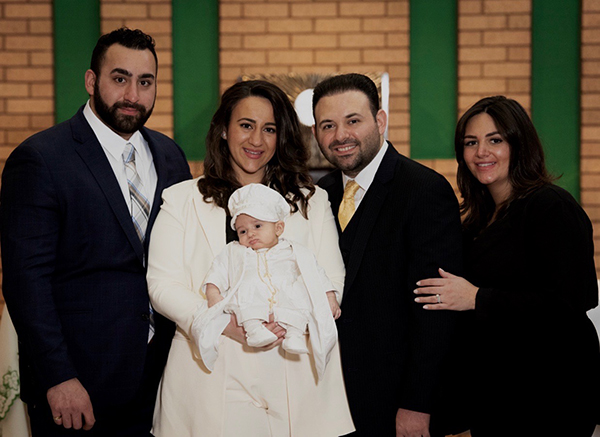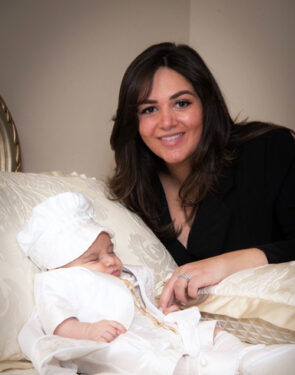PROSPECT HEIGHTS — For the next three years, if Catholic families in the Archdiocese of Catania in Italy want to baptize their babies, they’ll have to do so without godparents.

In a ruling that took effect Oct. 1, Archbishop Salvatore Gristina has banned the practice, out of concern that Catholics there aren’t taking godparenting seriously.
The Code of Canon Law requires that a godparent be a person who leads a life in keeping with the Church’s teachings and will be present to teach the baptized person Catholic values to live by.
Religious in Catania say Archbishop Gristina has become convinced that in too many instances, the role of godparent has been reduced to a “photo op” at the church.
It’s a different story here in the Diocese of Brooklyn.
Christina Panepinto was not familiar with the prohibition in Catania, but she is familiar with the role of godparent — and takes it seriously. Panepinto, a parishioner of Holy Trinity Church in Whitestone, is godmother to her nephew, Massimo DeVito, baptized in February.
“I was truly honored to take the role and fill that position because it is a big position to take — to help guide my godson through his life and through our faith,” she said.
Little Massimo’s father, Thomas DeVito, is Panepinto’s brother. DeVito is godfather to Panepinto’s little boy, Antonino, baptized in July. “My brother and I grew up with a strong faith and want to share it,” she said.
Panepinto’s attitude is one that officials in the Diocese of Brooklyn hope is widespread.
Godparents must have an understanding of what they are taking on, Church rules state.
“The primary teachers and witnesses of the faith are the parents. But godparents are there to aid the parents,” said Christian Rada, director of marriage, family formation, and respect-life education in the Diocese of Brooklyn. “And if parents cannot guide the child in matters of faith, the godparent steps in to fulfill that role.”
The job starts with the celebration of the sacrament of baptism.
“The rite itself is to remind godparents that, first and foremost, they are witnesses to the faith,” said Father Joseph Gibino, pastor of Holy Trinity and vicar for evangelization and catechesis. “I always ask parents this question: ‘Who do you want to raise your child in the event that something unfortunate happens to you?’ ”
There were 6,362 babies baptized in the Diocese of Brooklyn last year. Another 488 children who were above infancy were christened, as well as 349 adults.
Among the requirements: A godparent must be at least 16 years old and have received the sacraments of baptism, Communion, and confirmation. If the godparent is married, he or she has to have been married within the church. But one part of the protocol might surprise Catholics: There is no rule under Canon Law that the newly baptized must have godparents.

In addition to guiding her nephew, Panepinto looks at her role as one of passing on a family legacy. “My brother and I lost our Mom two years ago. We view godparenting as a way we can use our faith to help both of our sons have a connection with their grandmother, who’s not here physically but who has passed on and is in another life,” she said.
She intends to tell Massimo stories about his grandmother, she said.
While the decision on how to prepare parents and godparents for baptism is left up to individual pastors, the diocese does make recommendations.
One popular program parishes use is “Baptism Matters” — training sessions from Renew International featuring videos and exercises designed to give participants the tools to live out their vocations as godparents.
Another program commonly used is “Reborn,” a four-part course prepared by the Augustine Institute. It includes a session called “The Gift of Godparents: More Than Cards and Gifts.”
“There are many other programs that parishes use, and some parishes have designed their own,” Father Gibino said.
Parishes also have baptism prep teams to assist pastors and families. “I believe that the faith formation we give to our baptism prep teams brings home the fact that it’s not just the godparent who is going to be assisting in the upbringing of the child in the faith, but the entire faith community as a whole,” he said.
Father Gibino loves celebrating baptisms. “I always like to hold the baby before the baptism to get the baby used to the feeling of being in my arms because it’s so important for the baby to feel connected to the celebrant of the sacrament,” he said.
